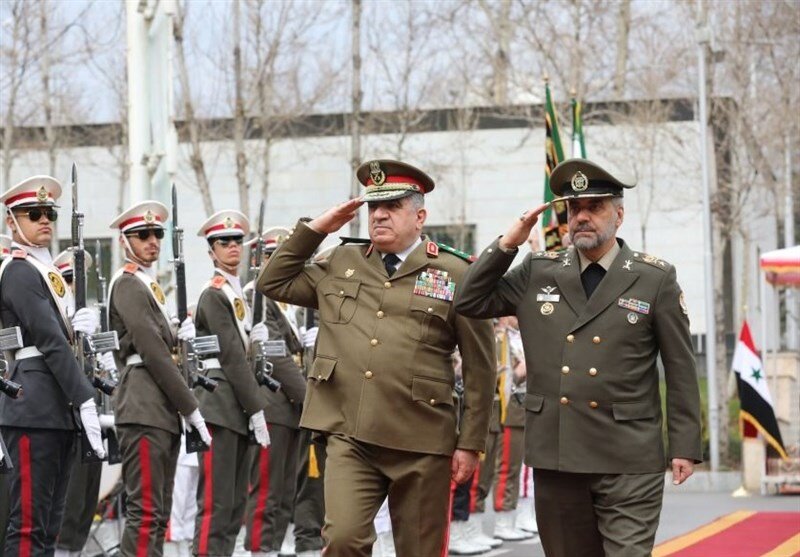Israel struck multiple sites in Syria hours after Iran hinted that it would give Syria weapons to “boost” its military power.
In a meeting between the defence ministers of Iran and Syria Saturday, the Iranian official said his country is willing to “utilize its full capabilities” to help Syria strengthen its “defence and deterrence” against Israel and the United States, IranInternational reported.
Shortly after, the Syrian army announced that Israeli missiles had hit “several points” in southern Syria early Sunday local time, injuring one soldier and causing some “material damage”.
No more details were offered immediately, neither by Syria nor by Israel –which rarely comments on such events. Several local sources reported, however, that the targets had links with Iran’s Revolutionary Guards (IRGC) and were located around the Syrian capital, Damascus.
Syrian opposition sources indicated Israel launched missiles from the Golan Heights targeting the Damascus countryside. Some reports spoke of large explosions lighting up the night sky.
Israel is known to launch frequent airstrikes inside Syria, often targeting IRGC-related sites or personnel. These airstrikes have intensified since October 7, when Hamas forces stormed Israeli territory bordering Gaza, killing more than a thousand civilians and soldiers.
The UK-based Syrian Observatory for Human Rights (SOHR) reported that the attacks on Sunday seem to have hit a weapons depot linked to Iran and a military airport, both in the outskirts of Damascus. SOHR has said that two Hezbollah bases in north-east Syria have been targeted.
It took place hours after the defense ministers of Iran and Syria met on Saturday –where the Iranian general warned Israel and America not to ‘intensify’ the ongoing crisis in the region.
Iran, Syria defense ministers condemn U.S., Israel’s attacks on Damascus
During a recent meeting in Tehran, Iranian Defense Minister Brigadier General Mohammad Reza Ashtiani and his Syrian counterpart, Ali Mahmoud Abbas, discussed the critical need for immediate actions to counter the attacks on Syria by the United States and Israel, Tehran Times reported.
Ashtiani warned against U.S. and Israeli plans to increase tensions in West Asia and expressed Iran’s readiness to help Syria enhance its defense capabilities to deter these threats. He emphasized the importance of deterrence against the Zionist regime’s aerial attacks and violations of Syria’s territorial integrity.
The ministers highlighted the significance of continued dialogue between their countries amidst regional developments, especially in the wake of recent visits and economic cooperation talks. They criticized the lack of international support and the silence of certain organizations and countries in the face of the humanitarian crisis in the region, which has resulted in tens of thousands of deaths and injuries.
The discussion also covered the ongoing violence in Gaza, with Ashtiani condemning the inaction of the United Nations and the Security Council in addressing the war crimes committed by Israel. Both ministers stressed the importance of establishing deterrence mechanisms to prevent further aggression and reiterated their condemnation of the unlawful U.S. military presence in Syria, which they argue contributes to regional instability and the displacement of Syrians.
The Syrian minister accused the U.S. of undermining regional stability and supporting separatist and terrorist groups through its illegal presence in Syria. He highlighted the importance of resistance against these destabilizing forces and the critical role of Iran-Syria cooperation in this context.
The meeting underscored both countries’ commitment to strengthening military cooperation and their shared perspective on the challenges facing the region, particularly the increased Israeli airstrikes against Syria and the situation in Gaza. Despite lodging complaints with the United Nations, Damascus’s calls for intervention against Israeli actions have remained unheeded.
How Syria’s Instability is Expanding in the Shadow of Gaza
National Interest published a report focusing on the instability in Syria, magnified by the ongoing Israel-Hamas conflict, which serves as a stark reminder of the complex interplay of regional interests and the detrimental impact on efforts to resolve other critical conflicts. Amid global focus on Gaza and the Occupied Palestinian Territories, Syria’s prolonged turmoil exemplifies the dangers of allowing conflicts to persist without resolution, especially as various actors exploit the instability to further their agendas.
Turkey’s military actions in Northeast Syria, Iran’s expansion of military facilities and attacks on U.S. forces, and Israel’s airstrikes against alleged weapons smuggling operations underscore the escalating regional power plays. These developments not only reflect the actors’ strategic interests but also highlight the broader implications for regional geopolitics and the pursuit of peace.
The situation is further complicated by the international community’s shifting focus away from Syria, despite the ongoing humanitarian crisis and the death toll surpassing 500,000. The tendency to “freeze” conflicts rather than seek sustainable solutions, coupled with the lack of a coherent policy strategy from key international players like the United States, perpetuates the cycle of violence and instability.
As conflicts in West Asia and beyond continue to intertwine and exacerbate each other, a comprehensive and people-centric approach to diplomacy and conflict resolution is urgently needed. Without decisive action and a recommitment to addressing the root causes of these crises, the prospects for peace and stability in the region remain bleak.


